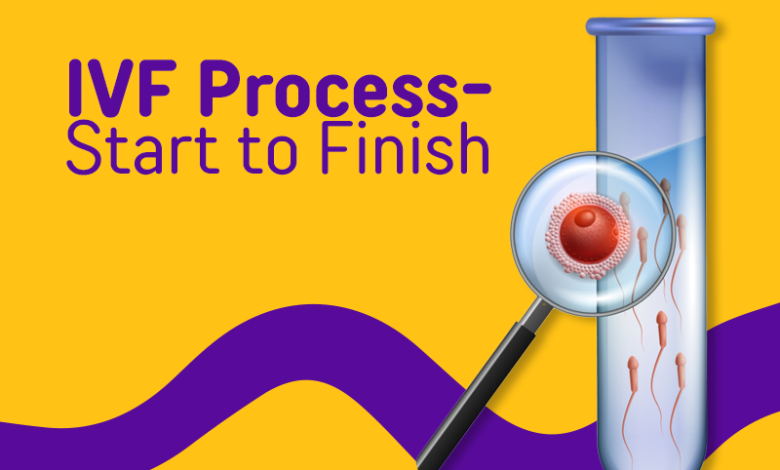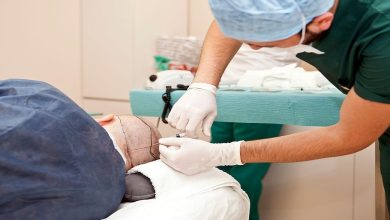IVF Cycle: A Step-By-Step Look at the IVF Process

IVF CycleWhen you think about typical fertility treatments, In-Vitro Fertilization (IVF) is definitely at the top of your mind. That’s because there’s a reason for it.
IVF has been around for decades, and you’ve probably heard of it: combining egg and sperm outside of the body in culture. But, both before and after the treatment, there’s a lot more to IVF than that.
Here in this post, we’ll have a look at the IVF process-start to finish and what you can expect during the IVF cycle.
A Brief Introduction to the IVF Cycle
The term “In Vitro Fertilization” comes from the Latin word “in glass.” The human body is beautiful, but it is also unpredictable. It’s tricky to see what is going on inside, even with the most advanced imaging technology available.
Whether or not we know what is causing a woman’s infertility, IVF is usually the most efficient option to help. IVF allows us to establish a controlled environment that greatly improves the chances of egg fertilizing.
In IVF, eggs and sperm are united in a laboratory dish—the “glass” in the name—incubated, and the fertilization process is then closely monitored. Successfully fertilized eggs grow into embryos over a period of 3 to 5 days. The embryo’s quality is next assessed in order to determine if it should be transferred, frozen, or cultured and developed further.
Now, let’s have a look at the IVF process from start to finish.
IVF Process- Start to Finish
Stimulating Your Ovaries:
Fertility drugs will be given to you, which will start the stimulation process. To put it another way, the medications, which contain Follicle Stimulating Hormone, will tell your body to generate more than one egg every month.
The more eggs you generate, the better your chances of fertilization later on in the process.
You’ll undergo regular transvaginal ultrasounds and blood tests to check on your ovaries and monitor your hormone levels at this stage of the IVF process.
Collecting Eggs:
You’ll get a hormone injection a little more than a day before your eggs are supposed to be taken out of your body. This injection will help your eggs mature quickly.
The eggs will then be removed using a tiny surgical procedure known as follicular aspiration. This procedure is usually done at your doctor’s office as an outpatient procedure.
Using ultrasound, your doctor will guide a small syringe into each of your ovaries through your vaginal canal. The needle has a gadget connected to it that suctions the eggs out one by one.
Don’t worry if this sound uncomfortable; you’ll most likely be given medicine beforehand to alleviate any discomfort. After that, you may experience some cramping, but this normally goes away within a day.
Collecting Sperm:
If you want to use fresh sperm, the male must provide a sample on the morning of your egg retrieval. Your fertility experts will generally have frozen or donor sperm ready and waiting in the lab if you intend on using it.
Our experts use a unique concoction to slow down the sperm so that they can identify the best ones under a microscope. The finest sperm is chosen and kept in the lab until they are ready to be delivered to the eggs.
Fertilization:
Experts receive your recovered eggs, which are still in the fluid from the ovaries’ follicles. The experts will then use high-power microscopes to locate and retrieve the eggs hidden in the fluid.
The eggs and sperm are then placed in a dish and given the opportunity to discover one another and fertilize spontaneously. The use of Intracytoplasmic Sperm Injection (ICSI) is another alternative.
ICSI is a procedure in which a single sperm is implanted into an egg to boost the chances of fertilization. It is critical that the eggs are fertilized rapidly, regardless of the procedure used.
Embryo Development:
The egg becomes an embryo once the sperm fertilizes it. Experts placed the embryo in a dedicated incubator with an ideal growth and development environment. A combination of amino acids is used to establish ideal circumstances comparable to how your body would nurture an embryo.
Over the course of five to six days, our scientists monitor the embryos. Regrettably, not all eggs will fertilize and develop into embryos. It’s possible that the eggs aren’t mature enough or that the sperm aren’t powerful enough.
Embryo Transfer:
If your embryo develops properly in the lab, you’ll be ready to transfer your embryo into your uterus.
The embryo transfer is similar to a pap smear in that it is a relatively straightforward procedure. It takes around 5 minutes, you’ll be awake, there’ll be no anaesthetic, and you’ll be able to get up right away. You can then go about your day as usual, and don’t worry; the embryo will not fall out if you get up or use the restroom.
An embryologist will evaluate and select the best embryo for transfer. After that, the embryologist will place your embryo in a catheter, which is a little tube. It is vital that this be done by a professional in order to cause the least amount of disruption to the embryo.
Your fertility specialist will next insert the catheter into your uterus via your cervix. You’ll need a half-full bladder for the transfer because it’s done under ultrasound supervision.
After IVF
You’ll take a progesterone supplement after the transfer to help strengthen the uterine lining and promote implantation.
Pregnancy Test 1: You will take your first pregnancy test at the clinic about 12 days following the embryo/blastocyst transfer. If it’s positive, we’ll make an appointment for a pregnancy test 2.
Pregnancy Test 2: This is performed within a week of the first positive pregnancy test. If it’s positive, your fertility expert will arrange an ultrasound for you in 2-3 weeks, following which you’ll be able to transfer your care to an OB/GYN.
The “two-week wait” is a term used to describe the interval between embryo transfer and the blood test. It’s tough to remain calm in the face of uncertainty. If you need assistance coping or someone to talk to, Dr Banker suggests fertility counselling.
What Should You Expect Treatments?
Changing Body:
During IVF procedures, it’s not unusual for women to gain a little weight. Hormone injections might affect your weight as well as your appetite. Additionally, your stomach will feel bloated depending on how many eggs mature or if you encounter any minor ovarian hyper stimulation.
Feeling Emotional:
If the extra hormones in your body aren’t enough to make you feel emotional, some patients may find their initial IVF treatment overwhelming. Expect to feel emotional about your experiences. It’s perfectly OK.
Feeling Distracted:
Some women experience “pregnancy brain” while undergoing IVF. It’s understandable, given that many patients are juggling professions and other responsibilities in addition to treatments and worrying about procedure outcomes. It’s pretty common to be distracted or forgetful, so don’t stress out.
Increased Appetite:
Some patients may report an increase in appetite; however, this may not happen to everyone. While certain drugs may enhance your hunger, an increased urge to eat is more typically due to emotional factors. Just keep it in mind to eat well.
Gastrointestinal Changes:
People who are undergoing IVF may have constipation or loose stools. To counteract digestive difficulties, be sure to drink enough water and consume meals high in fibre.
Feeling Frustrated:
Fertility treatments may be stressful for some individuals, especially if they are experiencing side effects from their drugs. You can reduce your anxiety by using stress-relieving techniques such as mild yoga, meditation, or acupuncture.
Getting Surprised:
Each patient’s fertility treatment is unique, and there is no such thing as a “typical” experience. If you get hungry throughout your treatments, don’t be shocked. Don’t be shocked if you find yourself needing extra sleep each night. And don’t be shocked if you discover this process to be much simpler than you anticipated. Expect the unexpected, as they say.
Also Read: In Vitro Fertilization- Myths VS Facts




